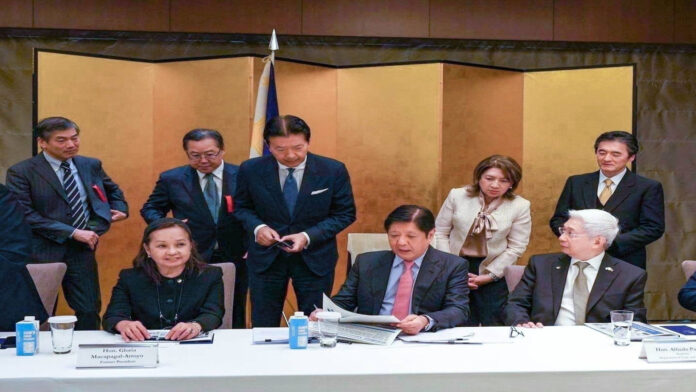President Ferdinand R. Marcos Jr. on Friday said the effects of the series of business meetings in Japan will be felt “very rapidly” after his five-day working visit in Tokyo.
Marcos said his trip is “very productive” considering the signing of 35 key investment deals between the Philippines and Japan.
“And I think that we will be able to feel the effects of these discussions, of these agreements, very, very soon, very rapidly back home in the Philippines,” Marcos said in an interview.
Marcos said his official visit to Japan is “particularly important” because it is “setting down the blueprint” for the two nations’ relations as they lay out their recovery plans from the coronavirus disease 2019 (Covid-19) pandemic.
He said the 35 business deals signed also “cut across the whole gamut.”
“They have supported our agriculture, they have supported our attempts at making the digitalization of the Philippines a more widespread phenomenon,” Marcos said.
“We’re talking about [agriculture], we are talking about digitalization, we are talking about industry, we are talking about automotive development, we are talking about energy, even education [and] tourism,” he added.
‘Deeper’ relations
Marcos also expressed gratitude to the Japanese government and business leaders he met for being “very open” to help “increase the development of our country.”
The meetings yielded positive results, Marcos said, noting several pledges will also help the Philippines in improving security and defense, and climate change mitigation and adaptation, among others.
Maros said the commitments from the Japanese government and business sector is an indication of “deeper” ties between Manila and Tokyo.
“Those relations have grown and have become deeper as time has gone on and we owe Japan a debt of gratitude for the support that they have given us in those years, even in the ‘60s, in the ‘70s and all the way up to now, where they have supported our infrastructure development,” he added.
“[This is] in terms of again, those areas: infrastructure, digitalization, agriculture, some of the traditional areas with which we had always dealt with Japan, but some new areas, areas such as security and defense and also mitigation and adaptation to the effects of climate change,” Marcos said.
Expansion of businesses
One of the Japanese firms that sought to expand their operations in the Philippines is Marubeni Corp., a major integrated trading and investment business conglomerate.
Marubeni officials, led by chief executive officer Masumi Kakinoki, reaffirmed their partnership with the Philippines in a meeting with Marcos in Tokyo, also on Friday.
“Now, in addition to the traditional generation system, we are very much committed to increase renewable energy like mini hydro, solar and wind project and we are discussing with your country, our local partner to develop such kind of new facilities,” Kakinoki told Marcos, thanking the President for the “solid partnership.”
Marcos also expressed gratitude to Marubeni, saying the Philippines’ partnership with the private firm “extends beyond the corporate and government-to-government partnership.”
“It’s a long-standing friendship, I think, at a very personal level,” he said, noting Marubeni’s “very, very high” profile in the Philippines.
Job creation
Meanwhile, the Federation of Free Workers (FFW) welcomed the billions of pesos worth of investment pledges from Japanese companies.
According to FFW national vice president Jun Ramirez, these industries will produce thousands of jobs in the country, including the semiconductor and electronics industries
“We are elated at the news, stating that the investments would create over 10,000 jobs for Filipinos, which is a significant development that could help ease the country’s unemployment problem,” he said in a statement over the weekend.
It was reported that Marcos met with Japanese businessmen involved in semiconductors, electronics, and wiring harness sectors, who are interested in expanding their operations in the Philippines.
Ramirez said Japanese employers have healthy labor relations with strong and responsible unions as workers’ bargaining agents.
At the same time, he said investments in agriculture and manufacturing are most needed today as these are considered growth areas. (PNA)
Photo credit: Facebook/BongbongMarcos


